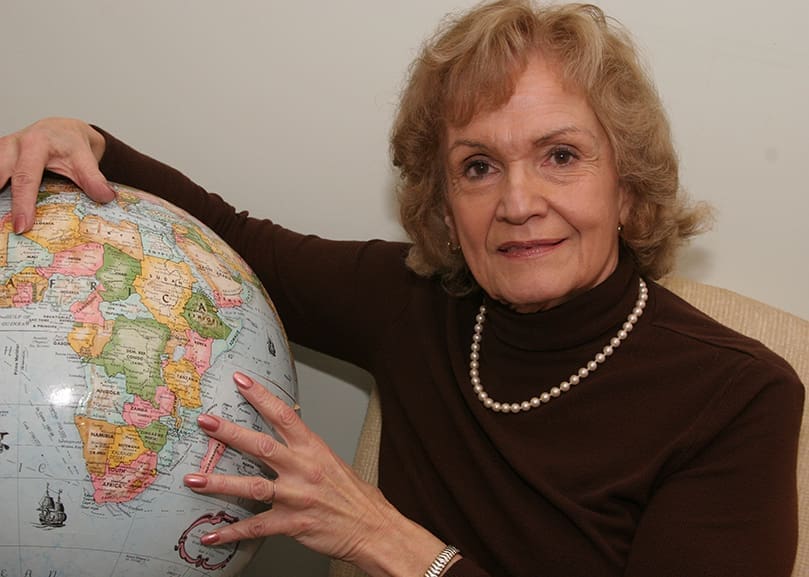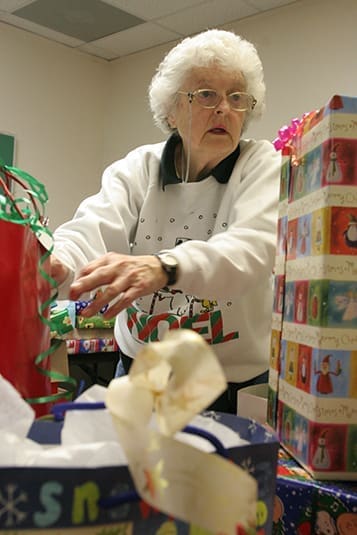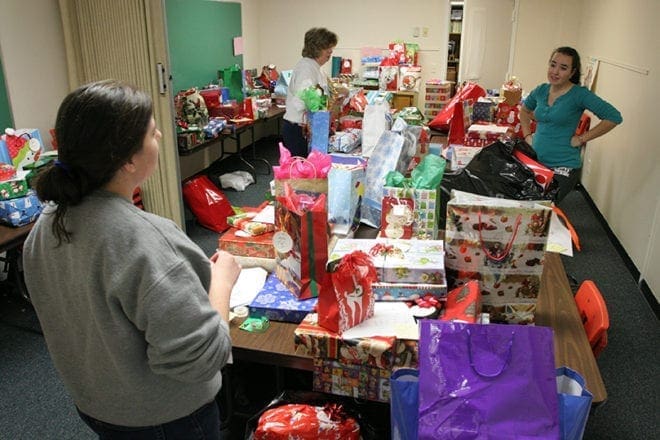 Photo By Michael Alexander
Photo By Michael AlexanderStone Mountain
She Puts Herself In Refugees’ Shoes
By ANDREW NELSON, Staff Writer | Published January 7, 2010
Hanging on the wall in Gini Eagen’s small office is a print of Our Lady of Guadalupe, a Madonna and child in an African setting, a drawing of flowers by a death row inmate she has visited for nine years.
A large globe fills a corner. It was a gift from a former pastor as refugees began to appear at the parish, so the staff would know a little bit about who was knocking at the door. “They were coming from places I had never heard of. My eighth-grade geography was a long time ago,” she joked.
For more than 20 years, Eagen has been caring for the sick, the elderly, refugees, people living through a crisis.
“The person who is at my door, that’s my ministry,” said Eagen, sitting behind her cluttered desk. Eagen is a pastoral assistant at Corpus Christi Church, Stone Mountain. “I treasure my work.”
Her work has taken her to the dusty countryside of Sudan, where tribal leaders slaughtered cows and goats in front of Eagen as a welcoming ritual. The custom is for the guests to step over the animals’ carcasses.
“It is a good thing I am not squeamish,” she said, with a smile.
In December 2005, she joined five Sudanese men returning to their homeland. The men were part of the Lost Boys of Sudan, a group of nearly 30,000 boys who were displaced or orphaned during a civil war in the east African country. She befriended them when a group of the refugees settled in Clarkston and the parish gave spiritual aid. They flew from Atlanta to Amsterdam to Uganda and then on a small plane into Sudan. (Her only fear on the trip was the plane would forget to pick them up for the return trip.)

Bobbie Liles of Corpus Christi Church, Stone Mountain, helps sort and bag some 280 Christmas gifts for 170 needy families and senior citizens. Photo By Michael Alexander
“I was surprised (by) her commitment,” said Stephen Bayok, 33, a refugee. “It was the time she lost her husband. Two, we didn’t know where we were going. We weren’t for sure where we were going.”
But Bayok recalled Eagen saying, “Wherever you are going, I will be there.”
They traveled under armed guard. They avoided robbers by leaving on trips at 3 a.m. The goal during the three weeks there wasn’t to solve the many problems they saw but to let people of Sudan know that others cared about them and to encourage young people, Eagen said. People came from miles around to greet the visitors.
“They wanted the world to hear them,” she said.
Eagen and the men met Bayok’s mother and family in a long-awaited reunion. He had lost contact with his family as his country was torn apart by war some 20 years earlier.
“They thanked me for bringing him home,” Eagen said. “They gave him back to me.”
And after greeting Bayok, his mother told Eagen, “You are his American mother.” To this day, members of the Sudanese community call her “Momma Gini.”
“It was an experience beyond … ” she said, pausing when she could not find the right word. “I was so blessed. ”
Bayok said Eagen is beloved by refugees in the community.
“She puts herself in their shoes,” he said.
After the trip to Sudan, Eagen invited Bayok to move into her home. He could quit working two jobs and concentrate on earning his bachelor’s degree from Clayton State University. He studies business. Bayok said he wouldn’t be graduating in May without the help of Eagen.
Eagen, who is 68, grew up in New Jersey as the youngest of three children. Her father worked as a dairy chemist. Her mother taught kindergarten and elementary school.
“I was always encouraged to learn and ask questions, and I did. I was always interested in justice,” she said.
Raised as an Episcopalian, Eagen became Catholic as a young adult. She said the experience helps her understand the “desire to become truly a part of the Catholic tradition” and the “yearning for the Eucharist.”

(Counter-clockwise, from bottom left) Robin Nevetral, a 2009 graduate of the University of Georgia, Athens, gives some instructions to her younger sister Rebecca, a sophomore at Georgia College and State University, Milledgeville, as Shelia Govignon checks to ensure that each child is receiving two gifts. The Nevetrals, along with their brother Greg, have volunteered with the parishÕs annual Christmas project for the last seven years. Photo By Michael Alexander
She is the mother of four children, one who died at 16 in an automobile accident. Her husband, Dennis, died in 2005. Her late husband’s job brought them to the area, much like other members of the parish, who were mostly newcomers to Atlanta.
“It has evolved into what I thought the Catholic Church was. Now I don’t have to dream it. It is here. If you are here on a Sunday morning, you see faces from all over the world,” she said. Some 60 different countries are represented in the parish.
Her service in the parish was pretty traditional at first, touching on a variety of needs, from adult education to ministry to the elderly.
Pastors encouraged her to work with “people that are hurting,” she said. And as the church community changed, so has her activity. Eagen joked that she only needs to read the headlines about international strife to predict where the next batch of refugees will come from.
Claretian Father Greg Kenny, a retired pastor at the parish, said Eagen is “pretty close to canonization.”
The two of them worked together for close to 17 years. Father Kenny said when he started, Eagen served as a mentor to him as he became familiar with the community.
Father Kenny said Eagen is dedicated to people who constantly interrupt her own schedule. “That person is her primary concern. You can see it in her face. She gives the person her mind, her heart, eyes and ears.”
He said it wasn’t a surprise she took the trip to Sudan. Her concern for refugees is obvious. “It was part of her soul. She doesn’t just serve people, she loves people. She is an amazing woman.”
Refugees have claim on Eagen’s heart.
“Knowing their stories, they will talk about the goodness of God. There was no horror that took that away,” she said. “It just puts things in perspective that is so basic, so real. Yes, God is good. I have learned so much from these dear people. I think the refugees are God’s gift to us.”